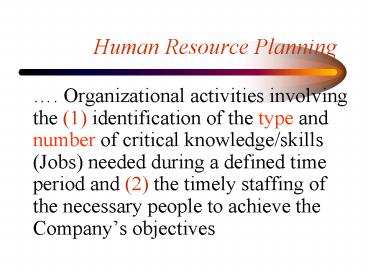Human Resource Planning PowerPoint PPT Presentation
1 / 18
Title: Human Resource Planning
1
Human Resource Planning
- . Organizational activities involving the (1)
identification of the type and number of critical
knowledge/skills (Jobs) needed during a defined
time period and (2) the timely staffing of the
necessary people to achieve the Companys
objectives
2
(No Transcript)
3
Human Resource Planning Forecasting
- . Using past and present information to identify
- (predict) the expected future conditions of
- Labor Demand (Expected Staffing Needs)
- Methods
- Qualitative (Delphi, Staffing Tables)
- Quantitative (Regression Analysis, Time Series
Analysis) - Labor Supply (Expected Staffing Availability)
- Methods
- Qualitative (Flow Models, Skills/Replacement
Charting) - Quantitative (Matrix Models)
4
Human Resource Planning Forecasting
- Problems with Forecasting
- Subjective
- Judgmental Even Objective (Quantitative) Methods
are to some degree subjective - Judgmental
- Complexity
- Limited to how accurately the Past (or future
predictions) REFLECT the Future
5
Recruiting A Two Way Street
- The Organization and the Candidate have a lot at
stake in the Selection Decision - Costs (Financial, Opportunity)
- Time (Effort/Energy)
- Job Expectations
- Contextual Expectations
- Personal
- Career
- Development
- Performance
6
Recruitment Strategies
- Natural Recruitment
- Applicants initiating recruitment
- Artificial Recruitment
- Applicants responding to Company initiatives
- Realistic Job Preview
- Accurately describing (or showing) the job
requirements and conditions to applicants - Not omitting the less desirable aspects of a job
7
Key Recruiting Issues
- Attracting a pool of qualified applicants
- Recruitment Source
- Internal
- External
- Recruitment Method
8
Factors Affecting Recruitment Strategy and Issues
- Business Strategy
- General Economic Conditions
- Specific Labor Market (Supply) Conditions
- Job Design - Skill Requirements
- Competition for (Skills) Labor (Demand)
- Government Regulation - EEO
- Job Design - Skill Requirements
- Time/Cost Constraints
- Other HR Activities
9
Internal Recruitment Sources
- Promotions
- Transfers
- Re-employment
10
Internal Recruitment Methods
- Job Postings
- Data Banks/Skill Inventories/Replacement Charts
- Supervisor Recommendations
11
Advantages of Internal Recruitment
- Motivational, morale, and performance enhancement
- Less expensive recruitment cost
- More information to make selection decisions
more accurate, safer - Know policies and organization
- Take advantage of past training
12
Internal Disadvantages
- Lack of qualified personnel
- Inbreeding
- Political favors
- Ones not selected may be resentful
- Time consuming Crown Prince
- Lack of acceptance by former peers/co-workers
13
External Recruitment Sources
- Educational Institutions
- College, Technical Schools, High Schools
- Referrals (Employee, Clients, Customers)
- Competitors (Pirating)
- e-Recruiting
- Job Fairs (Open House)
- Private Employment Agencies
- Executive/Professional Recruiters, Temp Agencies
14
External Recruitment Sources
- Professional Trade Associations
- Professional Trade Journals
- Walk-Ins (and Unsolicited Resumes)
- Public/Non-Profit Employment Agencies
- Newspaper, Radio, Television
- Bumper stickers, Banners, Movie Ads
15
Advantages of External Recruitment
- Acquire new skills
- Innovative ideas (new blood)
- Less susceptible to politics
- Less expensive than training your own (different
from text)
16
External Recruitment Disadvantages
- Not Accepted by Present Employees
- Time Required for Socialization and Orientation
17
The Recruiting Process Stages
- Recruiting Needs Analysis
- Recruiting Program Development
- Implementation of the Recruiting Program
- Recruiting Program Evaluation
18
Recruiting Program Evaluation
- Two Approaches
- Hawks Criteria (Quantitative )
- Cost Benefit Framework
- Cost Per Recruiting Source, Selection Ratios
- Cost Per Candidate
- Cost Per New Employee Acceptance
- Wanous (Qualitative) Framework
- Evaluates the Fit between selected recruits
expectations - (satisfaction) and organizational needs

